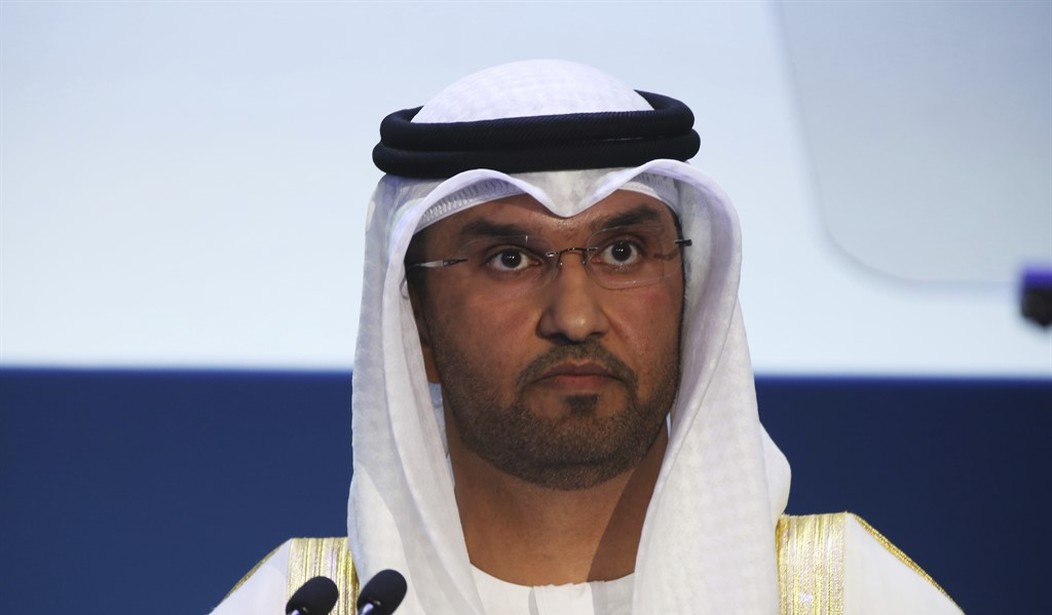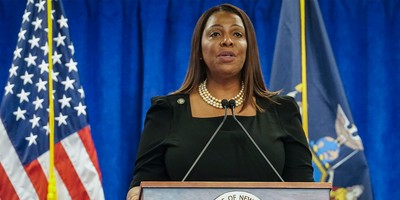If one values truth, then Christmas came early this year with the start of the COP 28 climate conference in Dubai. Not because there were breakthroughs that will save the Earth from the “existential threat” of climate change – there is no such threat, so the Earth doesn’t need saving. But because long suppressed truths are finally being spoken publicly, and truth should inform our decisions.
On the cusp of COP 28’s opening, Sultan Ahmed Al Jaber, head of the state oil and renewable energy companies and the COP’s host, spoke climate truth during a presentation he made shortly before the conference began. Al Jaber had been criticized for evidently planning to make oil and gas deals with willing countries on the sidelines of the conference — an act that should surprise no thinking person coming in an oil kingdom from an oil Sheik. What did he say that shocked the mainstream media and attendees and stirred so much angst? In response to a question at a conference, “I accepted to come to this meeting to have a sober and a mature conversation,” began Al Jaber. “I’m not in any way signing up to any discussion that is alarmist.
“There is no science out there, or no scenario out there, that says the phase-out of fossil fuel is what’s going to achieve 1.5,” Al Jaber continued. “A phase-down and phase-out of fossil fuel, is in my view, inevitable … but we need to be real, serious and pragmatic about it.”
When asked why he would not lead by example and end the development and use of fossil fuels in his country, calling for the same worldwide, Al Jaber responded soberly and accurately. Such a rapid premature phaseout would bring untold harm, especially to the poorest and most vulnerable around the world.
Recommended
“You are asking for a phase-out of fossil fuels, please help me, show me, the roadmap for a phase out of fossil fuels that will allow … for sustainable socio-economic development,” requested Al Jaber. “Unless you want to take the world back into caves.”
Such candor from a world leader on the topic of ending fossil fuel use is refreshing, and grounded firmly in facts, not model projections.
It may surprise some to learn that I agree with Al Jaber that a phase-out of fossil fuel use is likely inevitable. But it shouldn’t and hopefully won’t be forced upon society on some artificial timeline set in the vain attempt to control the weather. Rather for the peoples of the world, it will best occur when relatively inexpensive replacements are found that provide the benefits fossil fuel now largely uniquely provide: the more than 6,000 products in daily use; reliable and inexpensive electric power; and the chemicals and plastics that make possible modern agricultural abundance and critical public health technologies possible.
The second truth once again spoken, but largely ignored by the media, was that climate scientists, particularly those who work on the UN’s periodic climate reports, want to be given Czar-like powers, to both recommend and oversee the implementation of climate policies globally. As The Guardian wrote, “Five IPCC report authors say scientists should be allowed to make policy prescriptions and potentially oversee implementation … by the 195 states signed up to the UN framework convention on climate change (UNFCCC)."
Translation, “We the scientific elite, want governments to impose, under our guidance and legally binding oversight, polices to force people to comply with the climate diktats that we proscribe. The time for convincing people is past, Democracy is too slow and uncertain. We know the truth and should be allowed to force various nations to act according to our informed will.”
This is also not the first time UN climate officials have called for a conscious remaking of society. In 2015, Christiana Figueres, then the executive secretary of UN’s Framework Convention on Climate Change, admitted that climate policies are not about saving the planet or the environment, but about the power to remake society into a socialist paradise (as if there has been or ever could be such a thing).
"This is the first time in the history of mankind that we are setting ourselves the task of intentionally, within a defined period of time, to change the economic development model that has been reigning for at least 150 years, since the Industrial Revolution," Figueres said.
Alexandria Ocasio-Cortez’s (D-NY), chief of staff, Saikat Chakrabarti, admitted the same thing concerning the Green New Deal, saying, “[t]he interesting thing about the Green New Deal is it wasn't originally a climate thing at all. We really think of it as a how-do-you-change-the-entire-economy thing.”
And in February 2021, Massachusetts Undersecretary for Climate Change David Ismay said at a climate conference in Vermont that in the Northeast there were no more big climate “offenders,” to break, now it was time to “break” the people.
In the end, authoritarians will always try to cloak their ambitions in paternalistic terms, “we must do this for the good of, ‘the people,’ ‘the proletariat,’ ‘the volk,’ ‘society,’ ‘the planet,’” pick your term from the appropriate region and time period, but it is in reality all about increasing power and aggrandizing themselves.
In his farewell address, President Dwight Eisenhower, warned that with the advent of big government funding big science, the people should jealously guard their liberty.
“[H]olding scientific discovery in respect, as we should, we must also be alert to the equal and opposite danger that public policy could itself become the captive of a scientific-technological elite,” warned Eisenhower with grave demeanor and intonation.
In the immortal words of Don McLean, this time applied to climate industrial complex, “They would not listen, they're not listening still. Perhaps they never will.”
The need to uphold and defend scientific and political transparency and the peoples’ primacy in deciding and implementing public policies, after a careful weighing of the potential benefits and costs in terms of economics and personal liberty, has never been more critical.
H. Sterling Burnett, Ph.D., (hsburnett@heartland.org) is the Director of the Arthur B. Robinson Center on Climate and Environmental Policy at The Heartland Institute, a non-partisan, non-profit research organization based in Arlington Heights, Illinois.
























Join the conversation as a VIP Member